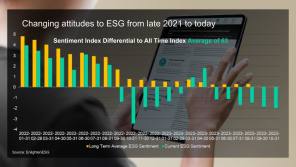
Article 1 / 4
Guide to Responsible InvestingAre we in the early stages of a responsible investment bubble?

Another question that has arisen is whether we are in the initial stage of a bubble. But there is also the view that sustainability and a longer-term horizon go hand in hand.
Oliver Jones, investment analyst at discretionary investment manager PortfolioMetrix, says responsible investment has attracted a large amount of interest and inflows over the past few years, with strategies focused on responsible investment performing very well relative to their ‘agnostic’ peers.
But Jones adds: “We do not believe there is a bubble in responsible investment as a lot of these investments are backed by long-term structural shifts in the economy, and are additionally being further supported by government policy – both of which are powerful drivers of future returns.
“However, we do believe there are certain areas of the responsible investment landscape that do look particularly expensive, especially relative to more cyclical areas of the market. For example, clean energy and those companies involved in the energy transition performed exceptionally well over 2020 and, despite the recent pull back, they still look very expensive relative to the broader market.”
Responsible investment funds under management totalled more than £56bn in January and grew 66 per cent over the previous 12 months, compared to 7 per cent across funds overall, according to the Investment Association.
Despite the recent popularity, Ryan Medlock, senior investment development manager at Royal London, says that responsible investing is not a novel approach.
“Although the focus on responsible investing has become sharper and more calculated over the past couple of years... investment managers have been integrating ESG, in some shape or form, into their processes over the past decade and longer in some cases.”
Mollie Thornton, senior investment manager at Parmenion, agrees that responsible investing has grown in popularity, but also notes we are not currently in bubble territory.
“Equity markets are kind of near record high and bond yields are at historical lows, so I think the whole market is in expensive territory, not just responsible investing.
“Responsible investing has become increasingly popular, so some parts of the market have looked a bit frothy recently. At the start of the year with the clean energy companies, some of those stocks were getting quite pricey. There are some names in the S&P Clean Energy Index that I think maybe got overbought a little bit as investors rushed into some of these funds.
“But actually we see there’s quite a lot of opportunity. Responsible investing is quite broad, and I think it’s about the usual basics of investing: making sure you’ve got diversification, making sure you’ve got different themes so you’re not just focused on one area. Potentially it could get expensive at a certain time but I don’t think we’re in bubble territory at this point, and I think there’s still exciting pockets of value at the moment.”
As for these opportunities, David Harrison, fund manager of the Rathbone Greenbank Global Sustainability fund, cites electrification of the global transport fleet and global infrastructure investment.
“Global EV penetration is below 5 per cent, yet many global automakers are pivoting to a full electrification strategy. This creates a number of investment opportunities, but it’s important to own the companies with durable barriers to entry and a long-term future.
“Equally we see a number of opportunities in global infrastructure investment. We anticipate significant investment in green infrastructure, such as sustainable buildings, water and renewable power. In each case it's critical to identify businesses that will be part of the long-term ecosystem and cannot be easily displaced.”
The role of responsibility in long-term investment
Similarly, Dean McSloy, partner at advice business The Private Office, does not think responsible investing is a bubble but a result of “changing global dynamics” from governments and chief executives around long-term sustainability.
“My personal view, longer term, is that every company that wishes to raise capital on public exchanges from investors is going to have to do better on environmental issues, social issues in the workplace and governance issues to attract that capital.
“The companies that aren’t scoring that well on ESG criteria are just not going to get the capital to expand the businesses that they run, and eventually their share price will depreciate on the back of it.”
Jones at PortfolioMetrix also refers to the role that responsible investing plays in long-term returns.
“At PortfolioMetrix, we believe that the consideration of environmental, social and governance factors are crucial to maximising long-term risk-adjusted returns for clients, as doing so ensures that all risks and opportunities related to an investment are understood.
“That said, ESG considerations aren’t the only important factors when selecting investments for the long-term. Traditional financial metrics such as those related to valuation still play a key part – just because a company performs well on ESG criteria, this doesn’t mean it’s also a good investment from a long-term, forward-looking perspective.
“Additionally, diversification is crucial from a portfolio construction point of view; strong ESG performers tend to be concentrated in the more quality and growth areas of the market such as clean energy, tech and healthcare and underweight in more cyclical areas of the market such as financials and more traditional energy companies. Therefore, relying solely on strong ESG credentials may leave you overexposed to particular areas of the market.”
Rob Morgan, chief analyst at Charles Stanley, says investors are increasingly aware that considering ESG factors is a critical part of the investment process, whether or not the product is labelled as ESG, responsible or sustainable.
“Imagine, for instance, investing in the oil and gas sector, without regard for the impact of climate change, or investing in tobacco stocks without thinking about the health consequences of the product and the legislative framework. All investors should at least be considering these sorts of factors.”
Chloe Cheung is a features writer at FTAdviser





